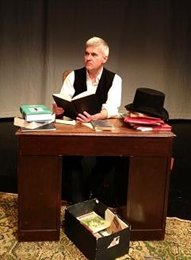Given the scope of his cultural and commercial influence, surprisingly little is known of Robert Shipboy McAdam, a member of a remarkable generation of Northern Presbyterians, who saw no contradiction between loyalty to the British Crown and devotion to the Irish language. Within the recently-designated Gaeltacht quarter of West Belfast, McAdam, who, among his many achievements, founded the Ulster Gaelic Society and compiled an unpublished English-Irish dictionary, is a revered figure. This venue, the Culturlann on the Falls Road, was named in shared memory of him and another distinguished Irish scholar Cardinal Tomas Ó Fiaich – Presbyterian and Catholic, joined together as a symbol of its cultural ethos.
Actor Noel McGee, a regular performer with Aisling Ghéar, has lovingly rescued McAdam from dusty obscurity and in this absorbing one-man show he sends audiences away intent on finding out more about an inspirational figure, whom history continues to pass by. McGee plays a passionate, obsessive academic, whose research is centred upon McAdam. On his desk sits the only known existing likeness of the man – a proud profiled but featureless silhouette. The study is a shrine to him, bursting at the seams with books, papers, manuscripts and, appropriately, a large globe.
Under Rory Casey’s soft lighting and to the strains of Gary Duffy’s haunting flute and whistles, the picture emerges of a man at ease in his beloved city, which, in the year of his birth 1808, is emerging from the carnage and slaughter of the 1798 Rebellion. His is a city of new horizons and economic prosperity, whose people are striving to put the past behind them and start afresh.
 McGee attempts and, for the most part, accomplishes the tricky task of delivering the lines in Irish, immediately followed in English translation. The steady hand and focused attention of director Bríd Ó Gallchóir ensures that, in a show that is less than an hour’s duration, an enormous amount of ground is covered and information imparted without becoming overly preachy or didactic. And it is to the credit of the actor that he rarely loses sight of the narrative drive of the story, with its gallery of colourful figures, from firebrand clerics to lyrical poets, simple country folk to captains of industry.
McGee attempts and, for the most part, accomplishes the tricky task of delivering the lines in Irish, immediately followed in English translation. The steady hand and focused attention of director Bríd Ó Gallchóir ensures that, in a show that is less than an hour’s duration, an enormous amount of ground is covered and information imparted without becoming overly preachy or didactic. And it is to the credit of the actor that he rarely loses sight of the narrative drive of the story, with its gallery of colourful figures, from firebrand clerics to lyrical poets, simple country folk to captains of industry.
McAdam was equally at ease with the workers in the family-owned Soho Foundry as with musicians, professors and writers. He delighted in travelling the hills and glens of Ulster, revelling in the native tongue of local people whose heritage he admired and promoted. McGee reminds us of his fluency in some 13 languages, including Arabic, Portuguese, Latin and, of course, Irish, and pops in intriguing anecdotes, such as the visit to Belfast of the Pasha of Egypt, whose palace windows were moulded at Soho.
The meticulously detailed, slightly ponderous script draws neat parallels with the Belfast of today, casting its central character as a man born way ahead of his time. But the mood darkens as we learn of his destitute final years and his enforced dependence on the kindness of friends and benefactors. Then, the narrative fast-forwards to the present, as McGee raises his face towards the surrounding slopes of the Black Mountain and Cave Hill. He envisages McAdam’s spirit stalking their slopes, looking down with satisfaction on a new Belfast, rising again from the ashes of the past, while images in sound and vision joyously register the laughter of children, their voices raised in celebration of their city – Béal Feirste!
Jane Coyle is a Belfast-based freelance arts journalist, critic and screenwriter, who regularly contributes to the Irish Times, The Stage, Culture Northern Ireland and BBC Radio Ulster.